Our view at Stack - Simplify growth with an all-in-one platform. Powerful marketing, sales, and support automation. Integrated CMS. Scalable software. Crafted for customer experience.
Whether commuting by car, bus, or train, I find myself watching the world — and billboard ads — go by. Billboard advertising has come a long way, from signs painted on barn roofs to sleek, powerful advertisements and multimedia sensations.
Billboard advertising isn’t your typical inbound marketing strategy. It relies on the customer coming to the ad instead of sending it to the customer. However, I find it’s a powerful way to build brand awareness, support other marketing channels like blogging, online lead offers, and SEO, and reach new audiences.
I’ll share everything I know about billboard advertising in this article, including my secret weapon for low-cost billboard advertising, to help you maximize your out-of-home (OOH) marketing efforts.

Table of Contents
- What is Billboard Advertising?
- Types of Billboard Advertising
- Does Billboard Advertising Work?
- Billboard Advertising Statistics
- Billboard Advertising Cost
- Billboard Advertising ROI
- Billboard Design Tips and Examples
Billboard locations are based on traffic — how many people will see the billboard — and are usually located beside busy roads, at offramps, near train stations, and in cities where many people pass by them daily.
Billboards are examples of out-of-home (OOH) advertising, similar to bus shelters, wallscapes, and posters.
Overall, billboards tend to have more views (impressions) than other marketing methods due to high-traffic locations, making billboard advertising great for brand awareness.
Types of Billboards
Today’s billboards are far more than just large signs on poles. There are five major types of billboards you can use in your OOH marketing campaigns, and some billboards cross categories.
1. Static Billboards
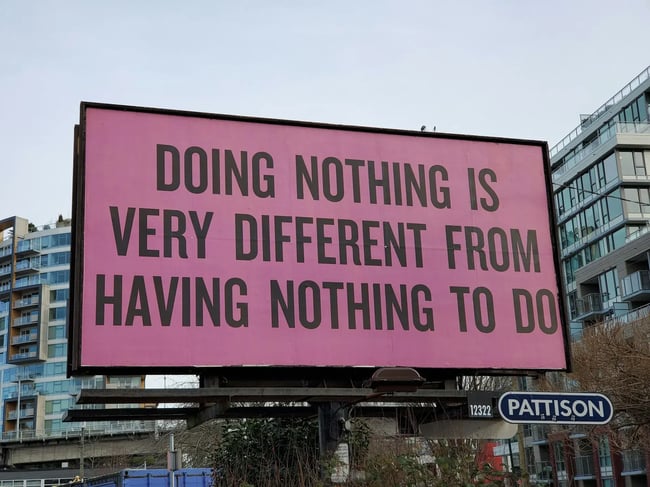
Image Source
These are the classic, large outdoor advertising displays you see along highways and busy urban areas. They feature a single, unchanging image or message.
Older billboards used to be hand-painted, but today’s static billboards are usually preprinted and pasted on in sections similar to wallpaper or printed on large vinyl sheets (often called vinyl billboards) and stretched across the sign for a smooth look. However, some static billboards are more creative in design.
Static billboards are effective for brand awareness and long-term advertising campaigns. They provide a constant visual presence that can reinforce your brand message over time. Some have even become protected landmarks, like the Pepsi-Cola sign in Queens.
2. Digital Billboards
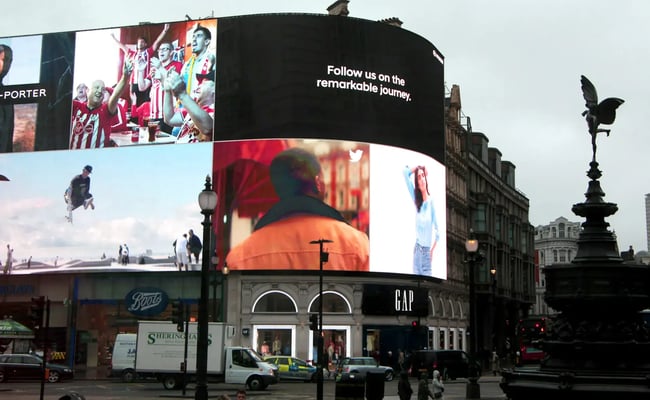
Image Source
Digital billboards are a dynamic form of outdoor advertising. Unlike static billboards, they use LED screens to display multiple eye-catching ads that include animations, changing images, videos, and even live updates.
My favorite feature of digital billboards is the ability to change the message quickly. If I need to update my ad or run a time-sensitive campaign, digital billboards make it possible without the hassle and cost of printing new materials. This flexibility is invaluable for promotions, special events, or providing real-time information.
3. Three-Dimensional (3D) Billboards
Three-dimensional billboards incorporate 3D elements like special effects to create a more immersive experience for viewers. While digital billboards create 3D effects through visual illusion, there are also physical 3D billboards with sculptural pieces (static or animated) added to them for more interest.
This heightened level of engagement is perfect for brand awareness campaigns, product launches, or any advertisement where you want to make a lasting impression.
4. Mobile Billboards
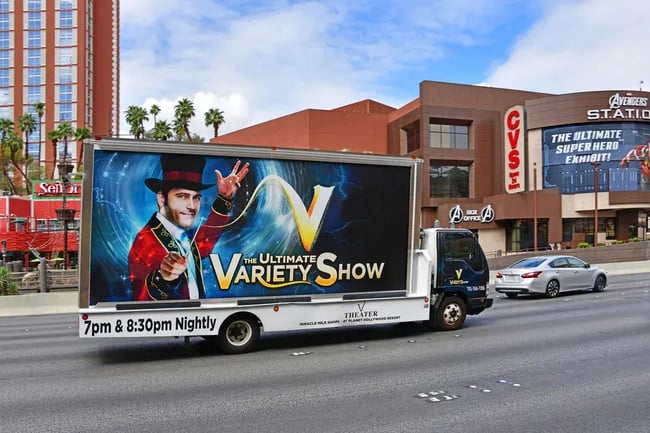
Image Source
Mobile billboards display ads on moving vehicles like trucks, buses, or cars. They take the message directly to the audience by traveling through various routes, which offers more reach than stationary billboards and puts the messaging at eye level.
One thing I love about these billboards is that you can use them to target specific areas or demographic groups. For instance, if I want to reach a particular neighborhood, I can schedule my mobile billboard to travel through those areas at peak times.
5. Interactive Billboards
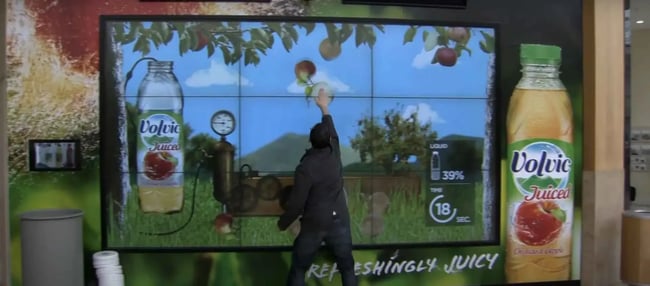
Image Source
Interactive billboards grab attention through a sense of novelty and incorporate touch screens, motion sensors, QR codes, augmented reality, and even smell to create a participatory experience for viewers.
Unlike passive traditional billboards, I can use interactive billboards to invite people to engage directly with my ads with real-time feedback and a multi-sensory experience that can leave a lasting impression on passersby.
Scented billboards in this category are becoming more common in large cities. Generally, they are placed near restaurants, coffee shops, bakeries, and fast-food chains to draw in consumers with yummy smells. One of the most famous examples is the Smells Like McDonald campaign, where the company used the smell of fries to attract pedestrians.
Fragrance and beauty companies can also leverage these billboards to give potential customers a preview of their latest scents.
Does Billboard Advertising Work?
Digital optical illusion 3D billboards revived interest in billboard advertising. Billboard ads of every type are still effective, even in the age of social media and online digital ads. They have unique features that online ads can’t replace, like:
- Constant visibility. Unlike online digital ads that I can block or skip, billboards are always on display, making my message consistently visible to everyone who passes by.
- High reach. Billboards reach a large audience because they’re positioned in high-traffic areas.
- Impactful presence. Billboards’ sheer size and bold designs make them stand out in busy environments and create lasting impressions on viewers.
- Geographic targeting. I can choose prime locations that align with my target audience’s daily routes to maximize engagement. For example, “exit now for” messages near offramps to my stores.
Mark Pierce, CEO and founding partner of law firm Wyoming Trust and LLC Attorney, shares that billboard ads are highly effective for his firm, “We want to be a name or brand that feels approachable and familiar to our audience without hitting them over the head. Billboards are a low-lift complement to achieving this.”
While billboard rental costs can be higher than digital advertising, they offer many benefits. The scale of the audience alone can significantly boost brand awareness and conversions.
Mia Anderson, a fashion expert and a founder of women’s fashion brand ChicSew, notes that “These campaigns often lead to an uptick in sales and customer inquiries, indicating that billboards effectively generate interest and drive consumer action.”
Further, she sees an increase in in-store foot traffic quickly following the launch of her billboard campaigns.
Billboard Advertising Statistics
Billboard ads are better accepted than online ads. OAAA research shows that 85% of people find OOH ads like billboards useful. In comparison, a Statista survey shares that online ads annoy 40% of users.
Plus, viewers remember out-of-home ads better. OOH Today found that out-of-home ads create more recall than:
- Print ads.
- Online ads.
- Podcasts and radio.
- Live and streaming television.
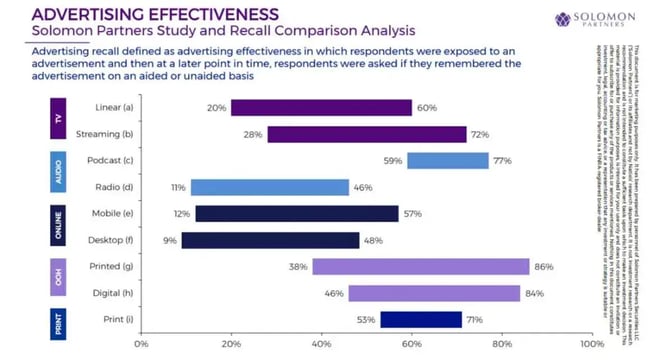
Image Source
Plus, consumers take action after seeing billboards. The OAAA research shows that 65% of viewers took action (like visiting a website or searching online) after seeing a digital billboard.
The most common billboard ads, with nearly 1.7 million ads displayed in the United States, are mobile billboard ads, likely because they are cost-effective compared to traditional billboards.
Those results may be why top brands are increasing their OOH advertising spending. In fact, OOH advertising revenue grew by 6.8% to $1.94 billion in the first quarter of 2024.
All that spending is driving the global digital billboard market, which is expected to increase to around $20.2 billion over the next five years.
Billboard Advertising Cost
Costs for billboard advertising primarily depend on:
- Billboard location.
- Total traffic in the area.
- Estimated number of people who will see your advertisement.
Geopath, a nonprofit organization, uses technology and media research to estimate the weekly impressions of every billboard in the country. Using that information, it assigns every out-of-home advertising opportunity an OOH rating, which ultimately determines its value and cost to advertisers.
OOH advertising companies that own the billboards pay Geopath for the information and base their rates on those ratings.
I’ve found that the average cost typically runs around $910 for four weeks, but big markets have big costs. For example, an ad could cost $50,000 for a day in Times Square, New York. Overall, digital billboard costs start at a much lower price than other billboard ads. While some can charge as little as $100 per month, the average cost of a four-week campaign is $417.
According to Geopath, up to 10 determining factors make up an OOH rating and, therefore, the cost of each billboard advertising opportunity. However, the three main factors do the bulk of the work.
Circulation
The number of people passing the billboard each week is called circulation, and it’s calculated from data provided by local transportation authorities.
Demographics
The characteristics of the audience make up the demographics. Geopath uses information from local transportation authorities and travel surveys to figure out the age, gender, income level, and other characteristics of people passing the billboard.
Impressions
Where circulation is a potential audience measure, impressions are an estimate of how many of that audience will actually see the billboard ad. It’s calculated based on many factors, including:
- Billboard size.
- How close it is to the road.
- Billboard visibility.
- Traffic speed beside the billboard.
- The billboard’s circulation.
Billboard ad design fees can start at $150 per hour, and the complexity of your desired design matters, too. For example, if I plan to create a 30-second 3D animation for my digital billboard advertising, the costs could start at $1,000 per minute.
Beyond renting advertising space on an existing billboard, there’s also the cost of designing and constructing the billboard if you’re getting creative with your billboard. Depending on what kind of billboard you want to create, this could cost anywhere from $2,000 to over $100,000.
Pro Tip: Self-service digital billboard ads are a low-cost option.
I promised my secret weapon for low-cost billboard advertising, and I keep my promises. A great way to start billboard advertising is with self-serve digital billboards.
Companies like Blip offer ads starting as low as $5 a day in some cases. You adjust the combination of impressions, location, and budget per day to fit your needs.
Billboard Advertising ROI
Billboard ads are profitable. Spiceworks’ 2022 study shows that digital billboards deliver a 38% ROI. Traditional billboards also have good ROI, with a 40% return on investment.
Gabriel Lukov, Head of Inbound Growth at enterprise software firm Businessmap, says they get an average ROI of 5:1 on their billboard advertising investments.
Meeting your ROI goals means researching and planning how to measure results. For example, adding a CTA with a unique URL for your billboard ad can help you track conversions.
While billboard advertising can’t match the ROI of some forms of content marketing like email (which has an incredible ROI of 3,800%), brand recognition is one of the most powerful reasons to advertise with a billboard. If that’s your focus, you may want to measure ROAS (return on ad spend) instead of ROI.
Pro tip: Use our ROI calculator.
Using an ROI calculator is a great way to help determine your budget if you plan to direct traffic to your website.
Billboard Design Tips and Examples
Easy-to-read and attention-grabbing billboard ads come from following solid billboard advertising design guidelines.
Here are my favorite billboard design tips for creating effective billboard ads.
1. Tell a (short) story.
Take viewers on a journey with your billboard through imagery and maybe some text. However, most drivers only have time to read a few words, so I try to show the essence of an idea rather than describe it with text.
For example, Apple’s iPhone challenges gather stunning images from iPhone users that highlight the product’s photography features. At the same time, they also add inspiration to public billboards.
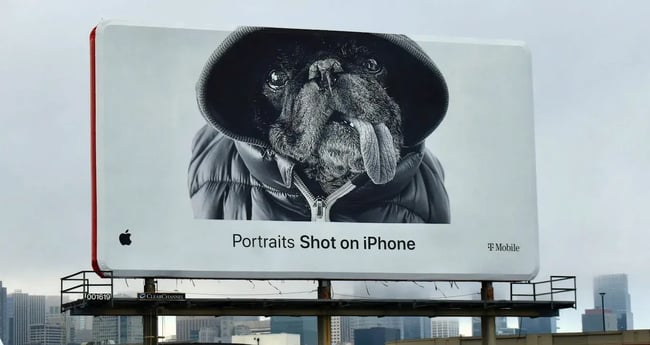
Image Source
A story doesn’t have to be complex to be exciting. This 3D digital billboard example from BMW tells the story of their latest model heading out for a quick drive while focusing on action.
2. Make it bold and simple.
You only get a few seconds to deliver your message to drivers and passersby. I recommend keeping your billboard design simple to reach the highest number of viewers (and potential customers). After all, people are often driving past your billboard at 70 mph.
Choose bold fonts in large sizes set against contrasting background colors. Colors should stand out to viewers and enhance visibility. For example, I avoid earth tones like greens and browns for billboards near a lot of trees.
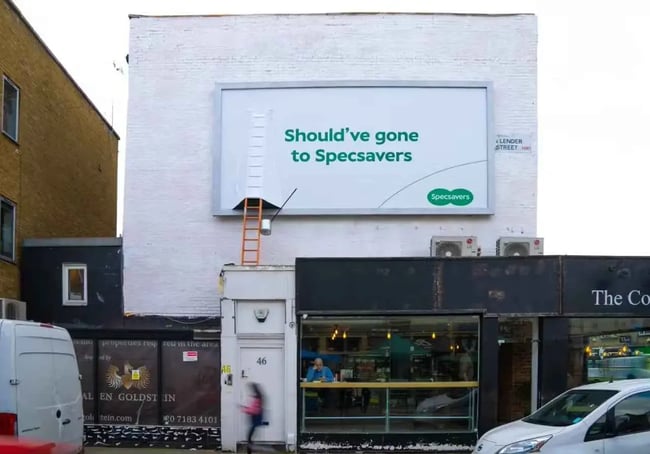
Image Source
Specsavers made an impact using simple text and color, plus a 3D prop. If your message is the most important part of your billboard, use design decisions like font, layout, and color to draw attention to it.
3. Consider the location.
I’ve lived in my current neighborhood long enough to foster a certain sense of pride. So, when I wander by authentic billboards that work with my location, I always pay attention.
Using sports, nicknames, nuances, or inside jokes related to the area can make the billboard (and brand) feel in touch with the community.
The popularity of the Shinjuku digital billboard in Tokyo, Japan, makes it an attraction for visitors and hosts many high-end creative ads, like this Nike example.
Some billboard advertising sticks around long enough it becomes a landmark and part of the community. For example, Portland stag billboard has become part of the local identity.
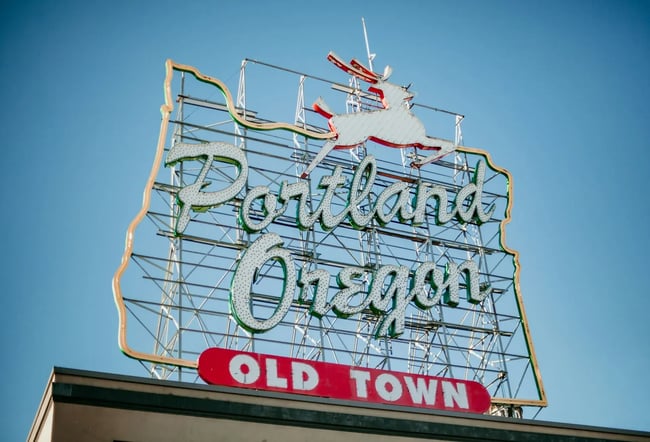
Image Source
4. Make it interactive.
Depending on my billboard’s location, I may be able to design it so it interacts with its surrounding environment. This strategy makes my ad stick out among the noise and grab the attention of passersby.
For example, Intel and Genvid collaborated on Project Monarch, which created an interactive game that allowed viewers to play it via their mobile devices and see the results on the billboard.
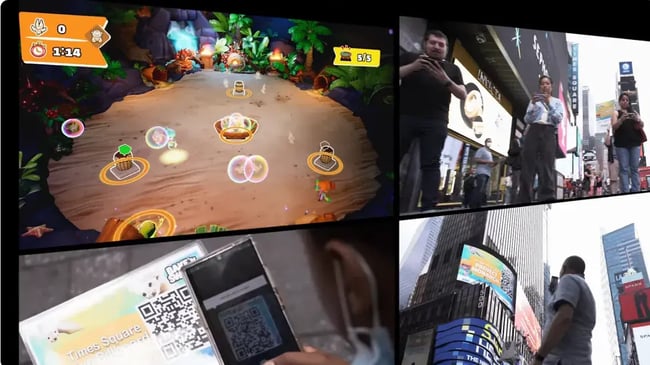
Image Source
5. Make it memorable.
OOH advertising needs to stand out from the hustle and bustle of a regular commute (or the monotony of a long road trip), and my billboards shouldn’t be any different.
I design my billboards to tell a story or share a call to action in exciting and memorable ways through emotion. Whether I use humor, outrage, empathy, or desire, emotional marketing tactics improve recall for my billboard designs.
Businesses aren‘t the only ones looking to advertise. I’ve also seen proud moms congratulating recent graduates, wedding proposals, and fans trying to save streaming shows on billboards.
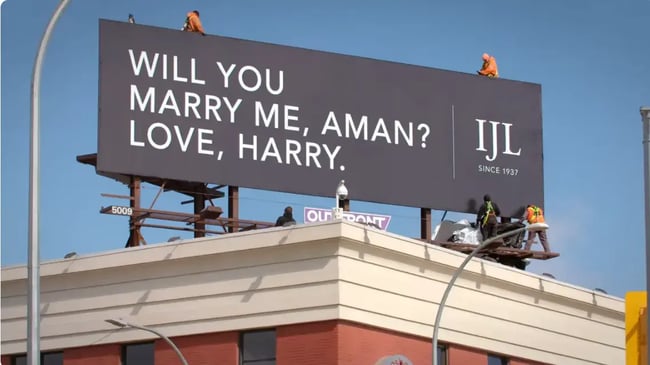
Image Source
While some of these efforts may not be right for your brand, they bring smiles and news attention, and many of these local efforts end up going viral.
Looking for more inspiration? Check out these edible billboard examples.
Out of Home Advertising: The Marketing You Never Knew You Needed
Billboard advertising may not be a common marketing strategy, but in my experience, it’s a highly effective way to promote your products and boost brand awareness.
My billboard design tips and examples are a great starting point to create your next billboard campaign. Who knows? Maybe your billboard will catch your next customer’s attention during their commute.
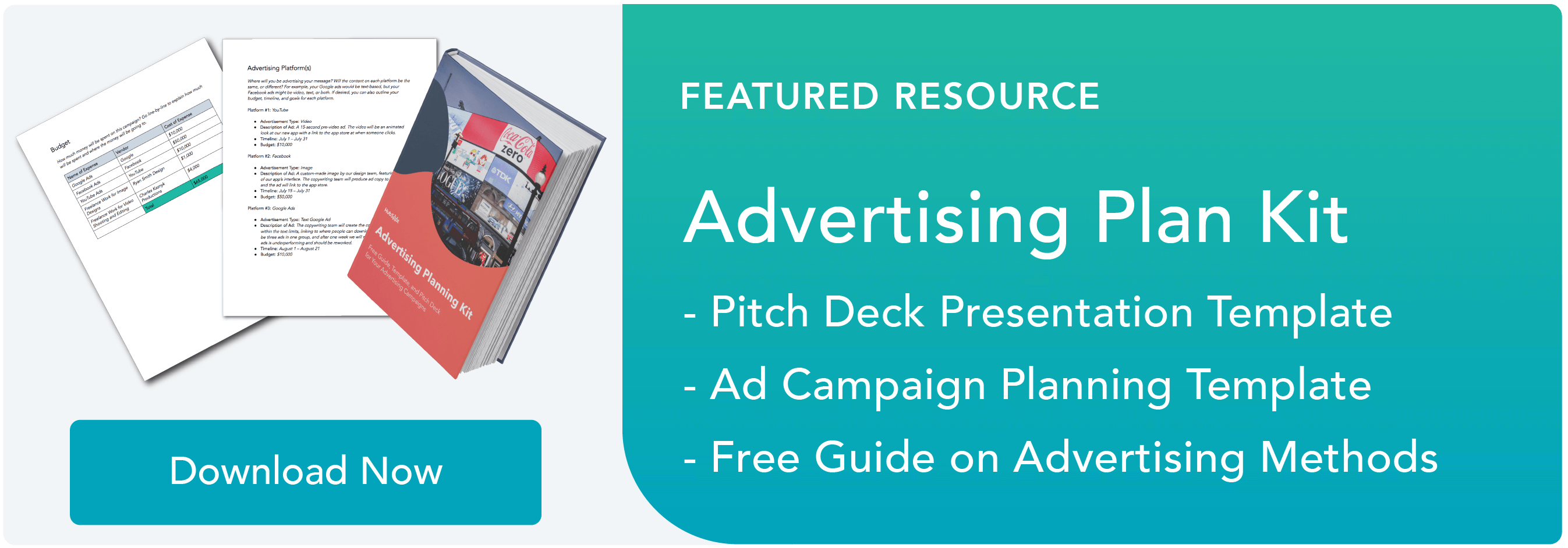
![]()
If Hubspot is of interest and you'd like more information, please do make contact or take a look in more detail here.
Credit: Original article published here.
